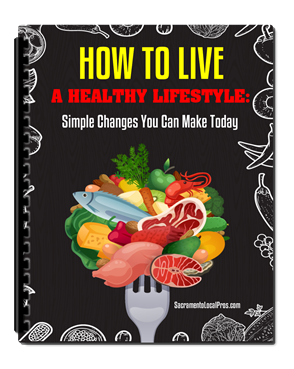Growing older doesn't have to mean slowing down or accepting declining health as inevitable.
Research shows that simple, sustainable changes to your daily routine can significantly impact how you age, helping you maintain vitality, mental sharpness, and physical strength well into your golden years.
The concept of healthy aging focuses on maintaining your quality of life rather than simply adding years to it.
While genetics plays a role, lifestyle factors account for approximately 70% of how we age.
This means the choices you make today—from what you eat for breakfast to how you spend your evenings—directly influence your health trajectory.
Let's explore ten lifestyle modifications that can transform your aging experience.
These aren't drastic overhauls requiring complete life restructuring.
Instead, they're small, manageable changes that compound over time to create profound benefits for your physical health, cognitive function, and emotional well-being.
1)) Start Moving More Throughout Your Day
Physical activity stands as one of the most powerful tools for healthy aging.
You don't need to become a marathon runner or spend hours at the gym.
Regular movement—even light activity—can reduce your risk of chronic diseases, improve balance, and boost mental health.
The key is consistency rather than intensity. A 30-minute daily walk can lower your risk of heart disease by 35% and reduce the likelihood of cognitive decline by 40%.
If thirty minutes feels overwhelming, start with ten-minute walks after meals. This approach helps regulate blood sugar while making exercise feel less daunting.
Strength training deserves special attention as we age. After age 30, we lose 3-8% of muscle mass per decade.
Two sessions of resistance training per week can slow this process dramatically.
You don't need heavy weights—bodyweight exercises like squats, push-ups, and planks work effectively.
Consider incorporating movement into existing routines. Take stairs instead of elevators, park farther from store entrances, or do stretches while watching television.
These micro-movements accumulate throughout the day, contributing to your overall activity level without requiring dedicated workout time.
2)) Prioritize Quality Sleep
Sleep quality often deteriorates with age, but poor sleep isn't an inevitable part of growing older.
Establishing consistent sleep habits can improve immune function, enhance memory consolidation, and reduce inflammation throughout your body.
Create a sleep-friendly environment by keeping your bedroom cool, dark, and quiet.
Invest in blackout curtains or an eye mask, and consider using a white noise machine if outside sounds disturb your rest.
The optimal bedroom temperature for sleep ranges between 60-67°F (15-19°C).
Develop a pre-sleep routine that signals your body to wind down. This might include reading, gentle stretching, or practicing meditation.
Avoid screens for at least an hour before bedtime, as blue light can interfere with melatonin production.
Pay attention to your sleep schedule's consistency. Going to bed and waking up at the same time daily helps regulate your circadian rhythm.
Even on weekends, try to maintain this schedule within an hour of your weekday times.
3)) Nourish Your Body With Whole Foods
Nutrition plays a crucial role in healthy aging, but you don't need to follow restrictive diets or eliminate entire food groups.
Focus on incorporating more nutrient-dense whole foods while gradually reducing processed options.
The Mediterranean diet offers an excellent framework for healthy aging.
This eating pattern emphasizes fruits, vegetables, whole grains, lean proteins, and healthy fats like olive oil and nuts.
Research shows that following a Mediterranean-style diet can reduce the risk of heart disease, certain cancers, and cognitive decline.
Prioritize colorful fruits and vegetables, aiming for at least five servings daily. Each color represents different antioxidants and nutrients that combat age-related cellular damage.
Berries, leafy greens, and cruciferous vegetables like broccoli and cauliflower pack particularly powerful nutritional punches.
Don't overlook hydration. As we age, our thirst sensation diminishes, making dehydration more common.
Shoot for eight glasses of water daily, adjusting for activity level and climate.
Herbal teas, sparkling water with lemon, and water-rich foods like cucumbers and watermelon contribute to your fluid intake.
4)) Cultivate Strong Social Connections
Loneliness and social isolation can impact your health as significantly as smoking or obesity.
Strong social connections boost immune function, reduce stress hormones, and may even extend lifespan by up to 50%.
Quality matters more than quantity when it comes to relationships. Having a few close, supportive relationships proves more beneficial than maintaining numerous superficial connections.
Focus on nurturing existing relationships while remaining open to new friendships.
Consider joining clubs, volunteering, or participating in community activities aligned with your interests.
These activities provide natural opportunities for social interaction while pursuing meaningful activities.
Religious or spiritual communities also offer social support networks for many people.
Don't underestimate the power of intergenerational relationships. Spending time with younger family members or volunteering with children can provide fresh perspectives and energy.
Similarly, connecting with peers who share similar life experiences offers understanding and support.
5)) Manage Stress Effectively
Chronic stress accelerates aging at the cellular level, contributing to inflammation, weakened immunity, and increased disease risk.
Learning to manage stress effectively becomes increasingly important as life presents new challenges.
Meditation and mindfulness practices offer proven stress-reduction benefits. Start with just five minutes daily, focusing on your breath or using guided meditation apps.
Regular practice can lower cortisol levels, reduce blood pressure, and improve emotional regulation.
Deep breathing exercises provide immediate stress relief and can be practiced anywhere.
Try the 4-7-8 technique: inhale for four counts, hold for seven, and exhale for eight. This activates your parasympathetic nervous system, promoting relaxation.
Identify your stress triggers and develop coping strategies. This might involve setting boundaries, practicing time management, or seeking support when needed.
Remember that asking for help is a sign of wisdom, not weakness.
6)) Challenge Your Mind Regularly
Cognitive health requires ongoing attention and exercise, just like physical fitness.
Engaging in mentally stimulating activities can help maintain cognitive function and may reduce the risk of dementia.
Learning new skills creates new neural pathways and strengthens existing ones.
Consider taking up a musical instrument, learning a new language, or exploring subjects that interest you.
Online courses make learning more accessible than ever before.
Reading regularly provides excellent cognitive exercise. Choose materials that challenge you slightly—not so difficult that they're frustrating, but engaging enough to require focus and thought.
Discuss what you read with others to enhance the cognitive benefits.
Puzzles, games, and brain training activities can be helpful when combined with other cognitive challenges.
Crosswords, sudoku, chess, and strategic games provide mental stimulation while being enjoyable.
7)) Maintain Regular Health Screenings
Preventive healthcare becomes increasingly important with age. Regular screenings can detect problems early when they're most treatable, potentially preventing more serious health issues.
Work with your healthcare provider to establish an appropriate screening schedule based on your age, health history, and risk factors.
This typically includes regular blood pressure checks, cholesterol monitoring, cancer screenings, and bone density tests.
Don't neglect dental and vision care. Oral health connects to overall health, with poor dental hygiene linked to heart disease and other conditions.
Regular dental cleanings and vision exams help maintain quality of life and can detect problems early.
Keep track of your health metrics, including blood pressure, weight, and any symptoms you experience.
This information helps your healthcare provider make informed decisions about your care.
8)) Protect Your Skin From Sun Damage
Skin health reflects overall health and can significantly impact how you age.
Sun protection is crucial, as UV damage accumulates over time and contributes to premature aging and skin cancer risk.
Use broad-spectrum sunscreen with at least SPF 30 daily, regardless of weather conditions.
Apply it to all exposed skin, including often-forgotten areas like ears, neck, and hands. Reapply every two hours when outdoors.
Wear protective clothing, wide-brimmed hats, and sunglasses when spending time outside. Seek shade during peak sun hours (10 AM to 4 PM) when possible.
Maintain a consistent skincare routine that includes gentle cleansing and moisturizing.
As skin produces less oil with age, moisturizing becomes increasingly important to maintain skin barrier function.
9)) Limit Alcohol And Avoid Smoking
Tobacco use and excessive alcohol consumption accelerate aging and increase disease risk.
If you smoke, quitting provides immediate and long-term health benefits at any age. If you drink alcohol, moderation is key.
Smoking cessation can be challenging, but numerous resources are available to help.
Consult your healthcare provider about smoking cessation aids, support groups, or counseling services.
The health benefits of quitting begin within hours and continue for years.
Moderate alcohol consumption means up to one drink daily for women and two for men.
Excessive drinking can interfere with sleep, contribute to weight gain, and increase the risk of various health problems.
Consider replacing some alcoholic beverages with healthier alternatives like sparkling water with fruit, herbal teas, or mocktails.
This reduces alcohol intake while maintaining social enjoyment.
10)) Find Purpose And Meaning
Having a sense of purpose contributes significantly to healthy aging. People with a strong purpose tend to live longer, experience less cognitive decline, and report higher life satisfaction.
Purpose can come from various sources: career, family, volunteer work, creative pursuits, or spiritual practices.
The key is finding activities that feel meaningful and align with your values.
Volunteering offers numerous benefits for healthy aging. It provides social connection, physical activity, mental stimulation, and a sense of contribution.
Find volunteer opportunities that match your interests and abilities.
Consider setting new goals or pursuing long-delayed dreams. Retirement or life transitions can provide opportunities to explore new interests or deepen existing ones.
Remember that it's never too late to start something new.
Making These Changes Stick
Successfully implementing lifestyle changes requires patience and realistic expectations.
Start with one or two modifications rather than attempting to change everything simultaneously.
This approach increases your likelihood of success and prevents overwhelm.
Track your progress using a journal, app, or simple calendar marks. Seeing your consistency builds motivation and helps identify patterns.
Celebrate small victories along the way—every positive change contributes to your overall health.
Expect setbacks and view them as learning opportunities rather than failures. Life circumstances, health issues, or other challenges may temporarily derail your efforts.
The key is getting back on track as soon as possible without self-judgment.
Consider enlisting support from family, friends, or healthcare providers.
Having accountability partners or joining groups with similar goals can provide encouragement and motivation during challenging times.
Conclusion
Healthy aging isn't about perfection—it's about progress. Each small change you make today contributes to a healthier, more vibrant future.
The most important step is starting, regardless of your current age or health status.
Remember that these lifestyle changes work synergistically. Improved sleep enhances your energy for physical activity.
Better nutrition supports cognitive function. Strong social connections reduce stress. Each positive change makes the others easier to maintain.
Begin by choosing one change that feels most manageable for your current situation.
Once it becomes a habit, gradually add others. Your future self will thank you for the investment you make today
Related Articles and Guides:
- 10 Ways To Look Younger Than Your Age For Women
- 10 Ways To Stay Mentally Sharp In Your 50s And Beyond
Download Our Free E-book!








